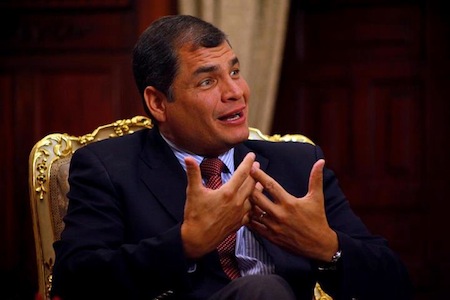One of the most fascinating aspects of the latest turn in the Julian Assange drama is why Ecuador — of all places — is so keen on offering Assange asylum. ![]()
Assange, the founder of Wikileaks, made public a huge trove of classified cables from the U.S. State Department, starting in February 2010. Assange has also been charged on a warrant by Sweden for sexual assault and voluntarily entered English custody in December 2010.
Assange claims that in Sweden (unlike in the Great Britain), he will be subject to extradition or illegal rendition to the United States, where he also claims he will be charged with espionage and other crimes in relation to the release of the U.S. classified cables. I will leave aside the issue of whether that’s a valid concern or paranoid delusion, but given the global attention now on Assange, it seems certain that the United States would face massive criticism and a significant soft-power blow, even among its allies, for such a move.
In any event, on June 19, Assange fled to the Ecuadorian embassy in London, and Ecuador granted asylum to Assange on August 16. The United Kingdom, for its part, refuses to guarantee the safe passage of Assange, who now faces the puzzle of getting from Ecuador’s embassy out of the country. The United Kingdom apparently sent a letter last week to the Ecuadorian embassy that seemed to threaten invasion of Ecuador’s embassy to reclaim Assange — that would appear to be a fairly significant break with the international law that governs diplomatic relations, which is one of the few areas of international law that countries take seriously as law.
Besides, the idea of UK foreign minister William Hague ordering a military siege in posh Knightsbridge to capture Assange is so outrageous (and hilarious) that I doubt the British government would ever stoop to something like that. Far better to wait it out until Assange tries to flee, or simply strip Ecuador of its diplomatic status by cutting off ties.
Assange raised the temperature even more Sunday with a scathing denunciation of the United States from the balcony of the Ecuadorian embassy.
But why would Ecuador even bother to step into such a fraught battle of international intrigue that has already become a headache for the United Kingdom, the United States, Sweden and Assange’s native country of Australia?
Max Fisher at The Atlantic makes the case that Ecuadorian president Rafael Correa is angling to pick a fight with a stalwart of Western government:
Though we can’t know the Ecuadorian government’s motivation for sure, engineering a high-profile and possibly protracted confrontation with a Western government would actually be quite consistent with Correa’s practice of using excessively confrontational foreign policy in a way that helps cement his populist credibility at home. It would also be consistent with his habit of using foreign embassies as proxies for these showdowns — possibly because they tend to generate lots of Western outrage with little risk of unendurable consequences.
That seems just about right, and it doesn’t hurt that South American ally Argentina already detests the United Kingdom over the status of the Falkland Islands (Islas Malvinas) since the 1982 war and before.
But there’s a vital element missing from this narrative: Correa faces reelection in February 2013.
Continue reading Correa reelection in Ecuador a key motive in Assange asylum incident
